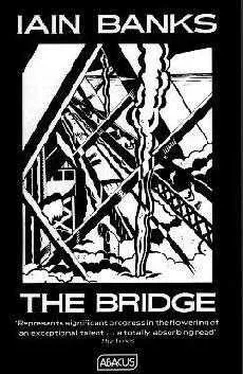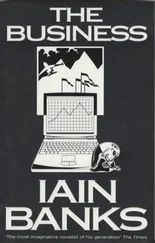The young receptionist starts to snigger; I turn to look at him, just as the telephone rings. He answers it.
'Dr Joyce's office,' he says. 'No, I'm afraid the doctor isn't here. He's at the annual conference for senior administrators.' He turns in his seat and looks at me as he says this, watching me with a look of spiteful condescension. 'Two weeks,' he grins at me. 'Do you want the long-distance code? Oh yes, good morning officer; yes, Mr Berkeley, of course. And how are you? ... oh yes? Has he? A washing machine? Does he really? Well that's a new one, I must say. Mm-hmm.' The young receptionist looks professionally serious and starts taking notes. 'And how many socks has he eaten? ... I see. Right. Yes, got that: I'll get a locum down to the launderette right away. That's quite all right officer, and may I wish you a very good day indeed? Bye now.'
My new doctor is called Anzano. His offices are about a quarter of the size of Joyce's, and eighteen floors below them, with no outside view. He is an old, tubby man with sparse yellow hair and matching teeth.
I get to see him after a wait of two hours.
'No,' the doctor says, 'I don't think there is much I can do about you being moved. Not what I'm here for, you understand. Give me time; let me read your file; be patient. I've got a lot on my plate just now. I'll get round to you as soon as I can. Then we'll see about getting you well again, what do you say?' He tries to look cheerful and encouraging.
'But in the meantime?' I ask, feeling tired. I must look a terrible sight; my face throbs, and vision out of my left eye is restricted. My hair is unwashed and I have been unable to shave this morning. How can I convincingly lay claim to my earlier way of life, looking the way I do; so badly dressed, and in every sense, I suspect, beaten?
'Meantime?' Dr Anzano looks perplexed. He shrugs. 'Do you need a prescription? Have you enough of anything you've been -' he is reaching for his prescription pad. I shake my head.
'I mean what is to be done about my ... situation?'
'Not a lot I can do, Mr. Orr. I'm not Dr Joyce; I can't issue grand apartments to myself, let alone my patients.' The old doctor sounds a little bitter, and annoyed at me. 'Just wait until your case is reviewed; I'll make whatever recommendations I think fit. Now is there anything else? I'm a very busy man. I can't go whizzing off to conferences you know.'
'No, there was nothing else.' I get up. 'Thank you for your time.'
'Not at all. Not at all. My secretary will be in touch with you about your appointment; very soon, I'm sure. And if there is anything you need, just give me a call.'
I return to my room.
Mr Lynch comes to my door again.
'Mr Lynch. Good day.'
'Oh, fuck; what happened to you?'
'An argument with an unhinged doorman; do come in. Would you like this seat?'
'Can't stay; I brought this.' He shoves a folded, sealed piece of paper into my hand. Mr Lynch's finger marks remain on the envelope. I open it. 'Post left it stuck in the door; could have got stole.'
'Thank you, Mr Lynch,' I say. 'Are you sure you can't stay? I was hoping to repay your kindness yesterday by inviting you to dinner this evening.'
'Aw, sorry pal, no. Got overtime to do.'
'Oh well, some other time then.' I scan the note. It is from Abberlaine Arrol; she confesses to quite brazenly using a fictitious dinner-date with me tonight to get out of an engagement of potentially terminal tedium. Will I agree to be an accomplice after the fact? She includes the phone number of her parents' apartment; I am to call her. I check the address; the note has been forwarded from my old rooms.
'OK?' Mr Lynch says, hands stuck in the pockets of his coat for all the world as though his trouser turn-ups are full of stolen lead and he is desperately trying to hold them up. 'No bad news, eh?'
'No, Mr Lynch, in fact a young lady wants me to take her out to dinner... I must make a phone call. Don't forget though; after this, you have first call on my meagre abilities as dinner-host.'
'Whatever you say, pal.'
My luck holds. Miss Arrol is in. Somebody I take to be a servant goes to find her. It takes several coins; I have to assume the Arrol apartments are of considerable size.
'Mr Orr! Hello!' She sound breathless.
'Good day, Miss Arrol. I received your note.'
'Oh, good. Are you free this evening?'
'I would like to meet then, yes, but ...'
'What's wrong Mr Orr? You sound like you have a cold.'
'Not a cold; it's my mouth ... It's ...' I pause. 'Miss Arrol, I would very much like to see you this evening, but I'm afraid I ... have suffered something of a reverse. I have been relocated, effectively demoted. Dr Joyce has had me put down, as it were. To level U7, to be precise.'
'Oh.' There is a flatness to the tone with which she pronounces this simple word which says more to me, in my feverish state, than a whole-hour of polite explanations about propriety, places in society, discretion and tact. Perhaps I am expected to say something more, but I cannot. How long do I wait, then, for some other word? Two seconds at most? Three? Nothing measured in bridge time, but long enough to pass through an instant of despair to a plateau of anger. Shall I put the phone down, walk away, make of this dirty thing as clean and quick an end as possible? Yes, now, to appease my own bitterness... but it is not in me. In a moment though, to spare the girl further embarrassment.
'Right, sorry, Mr Orr; I was just closing the door. My brother hanging around. Now, where have they moved you to? Can I help? Would you like me to come over there now?'
Orr, you are a fool.
I dress in the clothes of Abberlain Arrol's brother. She arrived here an hour before the time we arranged to meet, with a suitcase full of cast-offclothes, mostly her brother's; she reckons we are near enough the same build. I change while she waits outside. I was loath to leave her in such a vulgar area, but she could hardly have stayed in the room.
In the corridor, she is leaning, back against the wall, one leg drawn up behind her so that she rests one buttock on her foot, arms folded, talking to Mr Lynch, who looks at her with a sort of wary awe.
'"Oh no, dear,"' Abberlaine Arrol is saying, '"we always change ends at half-time."' She sniggers. Mr Lynch looks shocked, then snorts with laughter. Miss Arrol sees me. 'Ah, Mr Orr!'
'The same.' I make a small bow. 'Or rather, not quite.'
Abberlaine Arrol, resplendent in baggy trousers of rough black silk, matching jacket, cotton blouse, high heels and dramatic hat, says, 'What a dashing figure you cut, Mr Orr.'
'Bluntly spoken.'
Miss Arrol presents me with a black cane. 'Your stick.'
'Thank you.' I say. She puts out her arm, waiting, so I offer mine and she takes it. We face Mr Lynch, arm in arm. I can feel her warmth through her brother's jacket.
'Don't we look quite fine, Mr Lynch?' She asks, standing straight, head back. Mr Lynch shuffles his feet.
'Aw yeah; very ... very ...' Mr Lynch searches for a word. 'Very ... a very ... handsome couple.'
I would like to think that is just what we are. Miss Arrol seems pleased, too.
'Thank you, Mr Lynch.' She turns to me. 'Well, I don't know about you, but I'm starving.'
'So, what are your priorities now, Mr Orr?' Abberlaine Arrol rolls her whisky glass around between her hands, gazing through the blue lead glass and the light amber liquid at the flame of a candle. I watch her malt-wetted lips glisten in the same soft light.
Miss Arrol has insisted on buying me dinner. We sit at a window table in the High Girders restaurant. The food has been superb, the service discreetly efficient, we have space, fine wine, and an excellent view (lights twinkle all over the sea where the trawlers anchor the barrage balloons; the blimps themselves are vaguely visible, almost level with us, dull presences in the night reflecting the bridge's massed lights like clouds. A few of the brighter stars are also visible).
Читать дальше












